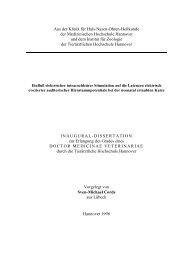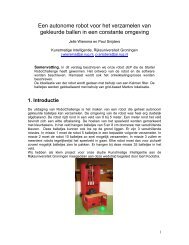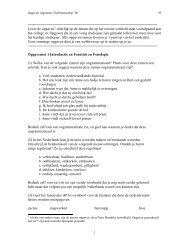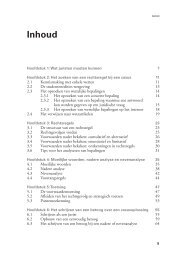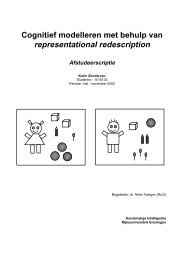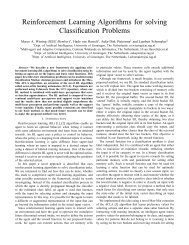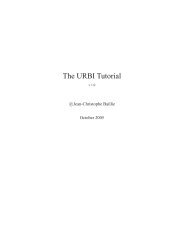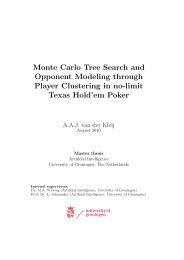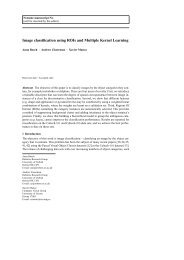Presuppositions in Spoken Discourse
Presuppositions in Spoken Discourse
Presuppositions in Spoken Discourse
Create successful ePaper yourself
Turn your PDF publications into a flip-book with our unique Google optimized e-Paper software.
Chapter 5<br />
often this correction referred to one argument of what was said earlier <strong>in</strong> the<br />
previous utterance.<br />
When it-cleft presuppositions were given an accommodated <strong>in</strong>terpretation it<br />
was often because there is an implication that there is a potential for the other<br />
discourse participants not to believe or to be unaware of the argument that is<br />
asserted. The whole structure is formed so as to highlight the contrasted or<br />
misunderstood argument, and the presupposed part is background <strong>in</strong>formation. Itclefts<br />
did not appear very often under embedd<strong>in</strong>g, only twice <strong>in</strong> the corpus, and<br />
both cases the presupposition was globally accommodated. I th<strong>in</strong>k the reason for<br />
this lies <strong>in</strong> their function, they are used to focus one argument of factual<br />
<strong>in</strong>formation, th<strong>in</strong>gs that the other discourse participants should be aware of. These<br />
types of mean<strong>in</strong>gs are not as likely to occur <strong>in</strong> hypothetical embedd<strong>in</strong>gs or <strong>in</strong> modal<br />
contexts.<br />
148<br />
Trigger Type<br />
Tendency to<br />
appear <strong>in</strong> an embedded<br />
context<br />
Tendency to be globally<br />
accommodated when nonnegation<br />
embedded<br />
def<strong>in</strong>ite NPs high high<br />
Factives medium low<br />
aspectual-verbs no special tendency high<br />
it-clefts low high<br />
Table 9 Tendencies to appear under embedd<strong>in</strong>g and to be globally<br />
accommodated for different triggers<br />
There are several possible explanations for differences <strong>in</strong> tendencies to appear <strong>in</strong> an<br />
embedded context and differences <strong>in</strong> tendencies to be globally accommodated<br />
when embedded. There may be a difference depend<strong>in</strong>g on the type of semantic<br />
object different triggers presupposed. And this <strong>in</strong> turn most likely relates to<br />
tendencies to be backgrounded or foregrounded.<br />
Actually I would say we need to separate the presupposition triggered from<br />
the asserted <strong>in</strong>formation with which the trigger is associated. If the presupposed<br />
<strong>in</strong>formation can be the focus of the speaker’s communication when us<strong>in</strong>g the<br />
trigger, then it can also contribute <strong>in</strong>formation substantial enough to function on<br />
its own <strong>in</strong> a hypothetical context. If the presupposed <strong>in</strong>formation is generally<br />
backgrounded <strong>in</strong> relation to the asserted <strong>in</strong>formation, and is a requirement for this<br />
asserted <strong>in</strong>formation as <strong>in</strong> the case of aspectual verbs, then it will tend to project<br />
out. The presuppositions associated with aspectual verbs generally can only serve as<br />
backgrounds, where factives can be both backgrounded or foregrounded. It-clefts<br />
already have an explicitly foregrounded element, the clefted constituent, so even if<br />
their presupposition can be partially or entirely new <strong>in</strong>formation, the rhetorically<br />
relationship between the presupposed <strong>in</strong>formation and the rest of the text will<br />
always be backgrounded, at least for most of the examples. Def<strong>in</strong>ite NPs on the<br />
other hand can be both foregrounded or backgrounded, mak<strong>in</strong>g a dist<strong>in</strong>ction here<br />
difficult to draw. However, when we want to <strong>in</strong>troduce a new discourse referent <strong>in</strong><br />
an embedded context we won’t choose a presuppositional expression.



